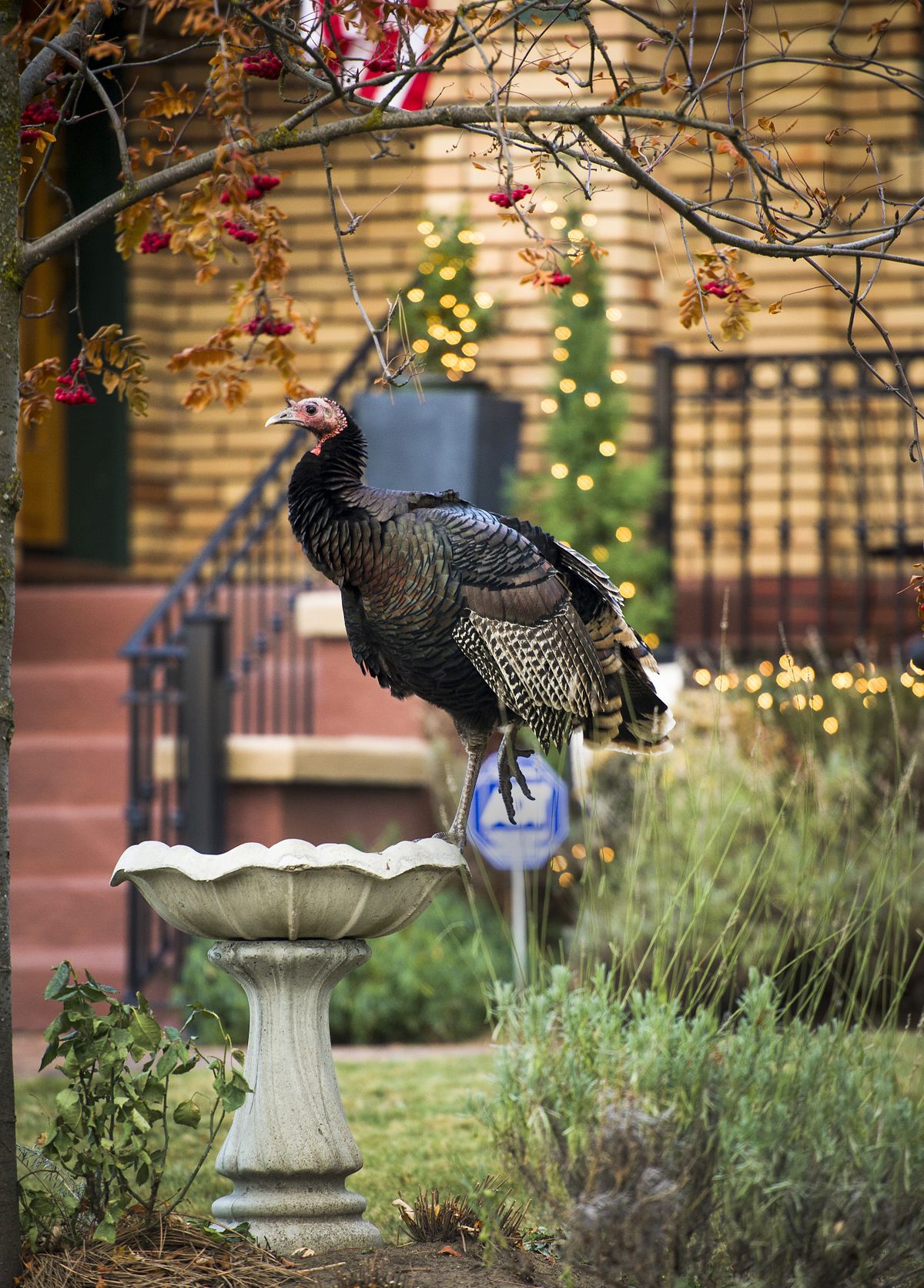Not everyone giving thanks for turkeys in Spokane

It seems that a turkey invasion is underway, with groups of them frequenting the South Hill, Spokane Valley and the North Side.
Several flocks of the birds – technically known as rafters – have set up camp in the neighborhoods around Manito Park, Cannon Hill Park and Cliff Park.
Although the turkey population isn’t tracked in urban areas in and around Spokane, many neighbors report increased sightings.
“They’re everywhere and they’re very bold,” said Madonna Luers, a Department of Fish and Wildlife spokeswoman.
Turkey numbers likely are up because recent winters have been mild.
“Winter is the great equalizer,” Luers said. “That’s what takes out the young, the sick, the weak.”
Some people love the turkeys for their entertainment value and coolness factor, while others abhor the noise and droppings on their lawns and sidewalks.
“I think they’re great,” said Brett Charity, who lives on 18th Avenue near Cannon Hill Park. “We feed them. We’ve had about 30 of them in our yard.”
Charity, who has given the neighborhood turkeys bread and pumpkin seeds, said he usually only sees them in the fall.
“They roll around in a couple different groups,” he said. “People driving by will stop and roll down the window and take pictures.”
Andrew Brajcich, who lives on 18th Avenue west of Lincoln Street, said he only saw a few hanging around last fall. This year, however, they’re everywhere.
“I think in one day I saw three different flocks,” he said. “This year, the numbers have exploded.”
Turkeys will eat whatever is available, whether it’s snacking at a backyard bird feeder, feasting on acorns or nibbling on pumpkins left on porches. They’ll also eat cat and dog food, Luers said. In the spring, they eat a lot of bugs.
“Turkeys are pretty opportunistic,” Luers said. “They’ll eat a little bit of everything.”
Wild turkeys from New Mexico, Arizona and Wyoming were introduced in Washington in 1960. Even more were brought to the state in the 1980s.
Turkeys usually roost in trees at night. Although people most often see them walking around foraging for food, they can run as fast as 25 mph.
The turkeys in the city have become accustomed to humans.
“I wouldn’t say they’re aggressive, but they’re not scared,” Brajcich said.
Luers said her department hasn’t received complaints about the turkeys living in Spokane.
“Some people just love seeing them and put stuff out for them and others say, ‘Oh, my God, they’re pooping everywhere,’ ” she said. “They can become a true nuisance, and they have in some areas.”
Stevens County is awash in turkeys, she said. Rafters settling on a power line are so heavy they have been known to snap the line. Sometimes they fly across roads and smash into windshields. In years past, they have created problems for farmers when they eat grain before it can be harvested.
If city residents don’t want turkeys hanging around they should remove all possible food sources and shoo them away, Luers said.
“When it’s cold and dry, open water will attract them,” she said. “If you’ve got them and you don’t want them, you just need to be assertive and aggressive with them. Unless there’s a constant food source, typically they’ll kind of come through maybe a day or two and move on.”
The South Hill turkeys are not greeted with universal love.
“I have a friend who hates them,” Alexandra Brajcich said. “Her neighbor feeds them.”
She likes the turkeys, though, and said they add a certain flavor to the neighborhood.
Anyone looking to add that flavor to their Thanksgiving table, however, can’t just go out and kill a turkey. Discharging a firearm is illegal within city limits. People can, however, kill the turkeys that hang around in more rural areas where shooting is allowed.
Turkey season will be open through Dec. 15, but anyone who wants to shoot a turkey must have a hunting license and a turkey tag first, Luers said.
“No fair going and getting the documentation after you kill the thing,” she said.